Related Research Articles

In ancient Greek religion and mythology, Demeter is the Olympian goddess of the harvest and agriculture, presiding over crops, grains, food, and the fertility of the earth. Although she is mostly known as a grain goddess, she also appeared as a goddess of health, birth, and marriage, and had connections to the Underworld. She is also called Deo. In Greek tradition, Demeter is the second child of the Titans Rhea and Cronus, and sister to Hestia, Hera, Hades, Poseidon, and Zeus. Like her other siblings but Zeus, she was swallowed by her father as an infant and rescued by Zeus.

Hades, in the ancient Greek religion and mythology, is the god of the dead and the king of the underworld, with which his name became synonymous. Hades was the eldest son of Cronus and Rhea, although this also made him the last son to be regurgitated by his father. He and his brothers, Zeus and Poseidon, defeated their father's generation of gods, the Titans, and claimed joint rulership over the cosmos. Hades received the underworld, Zeus the sky, and Poseidon the sea, with the solid earth available to all three concurrently. In artistic depictions, Hades is typically portrayed holding a bident and wearing his helm with Cerberus, the three-headed guard-dog of the underworld, standing at his side.
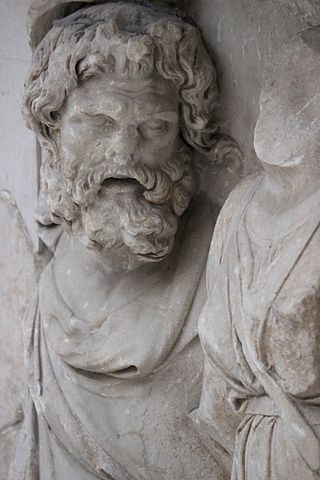
In Greek mythology, Nereus was the eldest son of Pontus and Gaia, with Pontus himself being a son of Gaia. Nereus and Doris became the parents of 50 daughters and a son (Nerites), with whom Nereus lived in the Aegean Sea.

In Greek mythology, the Nereids or Nereides are sea nymphs, the 50 daughters of the 'Old Man of the Sea' Nereus and the Oceanid Doris, sisters to their brother Nerites. They often accompany Poseidon, the god of the sea, and can be friendly and helpful to sailors.
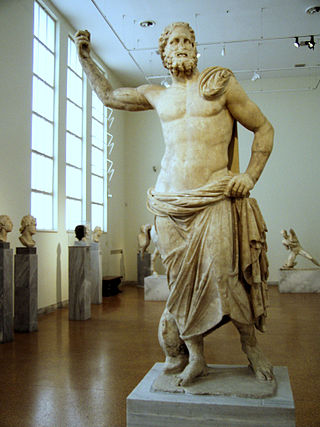
Poseidon is one of the Twelve Olympians in ancient Greek religion and mythology, presiding over the sea, storms, earthquakes and horses. He was the protector of seafarers and the guardian of many Hellenic cities and colonies. In pre-Olympian Bronze Age Greece, Poseidon was venerated as a chief deity at Pylos and Thebes, with the cult title "earth shaker"; in the myths of isolated Arcadia, he is related to Demeter and Persephone and was venerated as a horse, and as a god of the waters. Poseidon maintained both associations among most Greeks: he was regarded as the tamer or father of horses, who, with a strike of his trident, created springs. His Roman equivalent is Neptune.

In ancient Greek mythology and religion, Persephone, also called Kore or Cora, is the daughter of Zeus and Demeter. She became the queen of the underworld after her abduction by her uncle Hades, the king of the underworld, who would later also take her into marriage.

In Greek mythology, Proteus is an early prophetic sea god or god of rivers and oceanic bodies of water, one of several deities whom Homer calls the "Old Man of the Sea". Some who ascribe a specific domain to Proteus call him the god of "elusive sea change", which suggests the changeable nature of the sea or the liquid quality of water. He can foretell the future, but, in a mytheme familiar to several cultures, will change his shape to avoid doing so; he answers only to those who are capable of capturing him. From this feature of Proteus comes the adjective protean, meaning "versatile", "mutable", or "capable of assuming many forms". "Protean" has positive connotations of flexibility, versatility and adaptability.
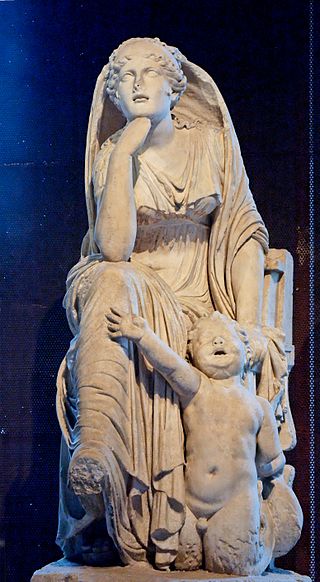
Thetis is a figure from Greek mythology with varying mythological roles. She mainly appears as a sea nymph, a goddess of water, and one of the 50 Nereids, daughters of the ancient sea god Nereus.
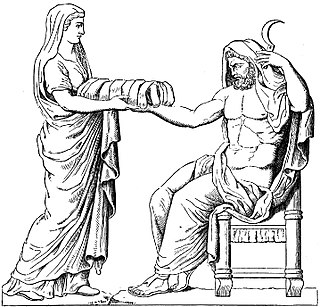
Rhea or Rheia is a mother goddess in ancient Greek religion and mythology, the Titaness daughter of the earth goddess Gaia and the sky god Uranus, himself a son of Gaia. She is the older sister of Cronus, who was also her consort, and the mother of the five eldest Olympian gods and Hades, king of the underworld.
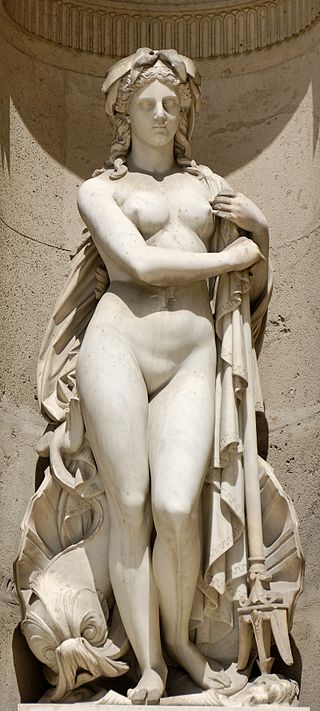
In ancient Greek mythology, Amphitrite was the goddess of the sea, the queen of the sea, and her consort is Poseidon. She was a daughter of Nereus and Doris. Under the influence of the Olympian pantheon, she became the consort of Poseidon and was later used as a symbolic representation of the sea. Her Roman counterpart is Salacia, a comparatively minor figure, and the goddess of saltwater.
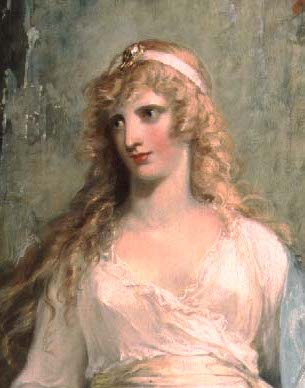
In Greek mythology, Calypso was a nymph who lived on the island of Ogygia, where, according to Homer's Odyssey, she detained Odysseus for seven years. She promised Odysseus immortality if he would stay with her, but Odysseus preferred to return home.
The ancient Greeks had numerous water deities. The philosopher Plato once remarked that the Greek people were like frogs sitting around a pond—their many cities hugging close to the Mediterranean coastline from the Hellenic homeland to Asia Minor, Libya, Sicily, and southern Italy. Thus, they venerated a rich variety of water divinities. The range of Greek water deities of the classical era range from primordial powers and an Olympian on the one hand, to heroized mortals, chthonic nymphs, trickster-figures, and monsters on the other.

Despoina or Despoena was the epithet of a goddess worshiped by the Eleusinian Mysteries in Ancient Greece as the daughter of Demeter and Poseidon and the sister of Arion. Surviving sources refer to her exclusively under the title Despoina alongside her mother Demeter, as her real name could not be revealed to anyone except those initiated into her mysteries and was consequently lost with the extinction of the Eleusinian religion. Writing during the second century A.D., Pausanias spoke of Demeter as having two daughters; Kore being born first, before Despoina was born, with Zeus being the father of Kore and Poseidon as the father of Despoina. Pausanias made it clear that Kore is Persephone, although he did not reveal Despoina's proper name.
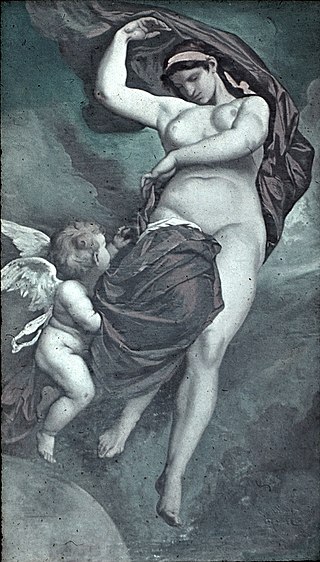
In Greek mythology, Gaia, also spelled Gaea, is the personification of the Earth. Gaia is the ancestral mother—sometimes parthenogenic—of all life. She is the mother of Uranus (Sky), from whose sexual union she bore the Titans, the Cyclopes, and the Giants; as well as of Pontus (Sea), from whose union she bore the primordial sea gods. Her equivalent in the Roman pantheon was Terra.
Dione is the name of four women in ancient Greek mythology, and one in the Phoenician religion described by Sanchuniathon. Dione is translated as "Goddess", and given the same etymological derivation as the names Zeus, Diana, et al. Very little information exists about these nymphs or goddesses, although at least one is described as beautiful and is sometimes associated with water or the sea. Perhaps this same one was worshiped as a mother goddess who presided over the oracle at Dodona, Greece and was called the mother of Aphrodite.
References
- names after mythology in LPSN ; Parte, Aidan C.; Sardà Carbasse, Joaquim; Meier-Kolthoff, Jan P.; Reimer, Lorenz C.; Göker, Markus (1 November 2020). "List of Prokaryotic names with Standing in Nomenclature (LPSN) moves to the DSMZ". International Journal of Systematic and Evolutionary Microbiology. 70 (11): 5607–5612. doi: 10.1099/ijsem.0.004332 .
- ↑ Help! Latin! How to avoid the most common mistakes while giving Latin names to newly discovered prokaryotes. Microbiología (Sociedad Española de Microbiología), 1996, 12, 473-475. "H.G. Trüper: Help! Latin! How to avoid the most common mistakes while giving Latin names to newly discovered prokaryotes". Archived from the original on 2011-10-07. Retrieved 2011-04-14.